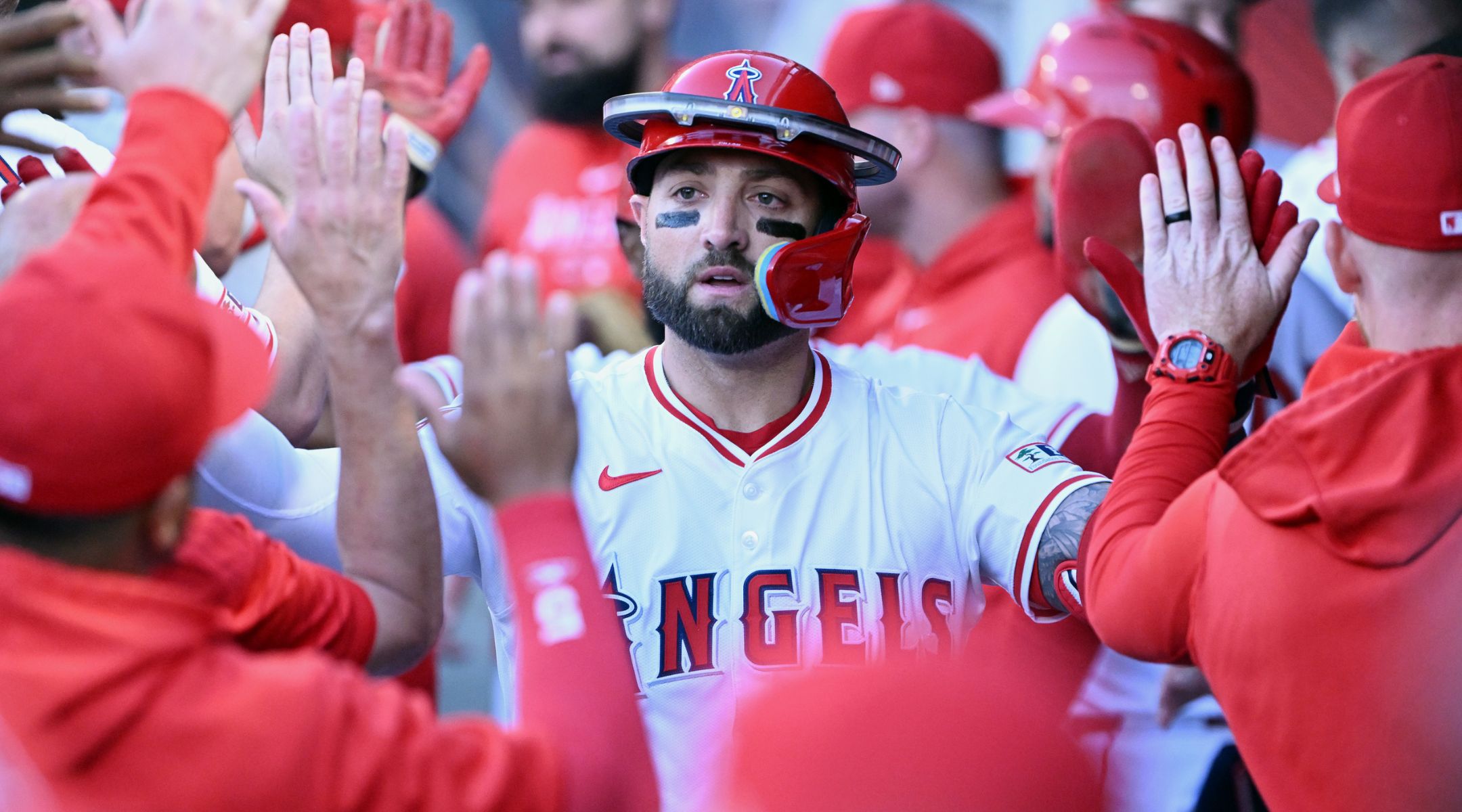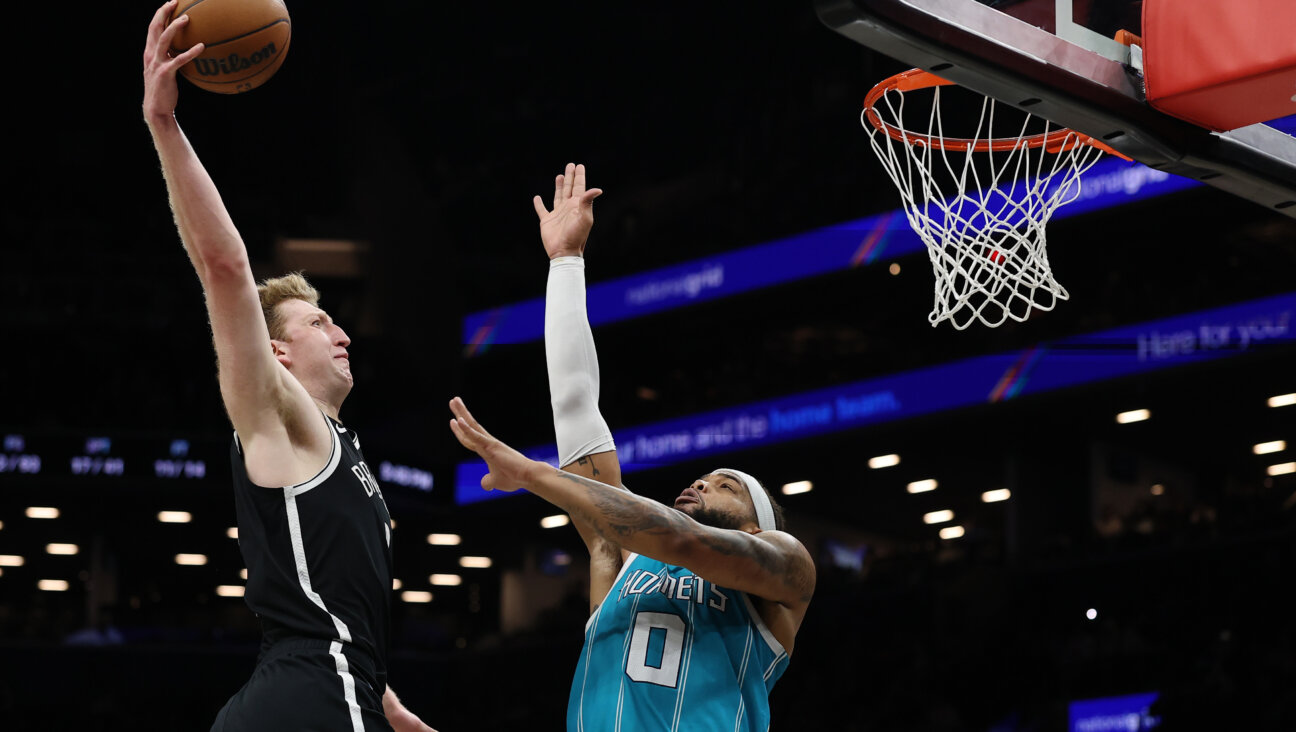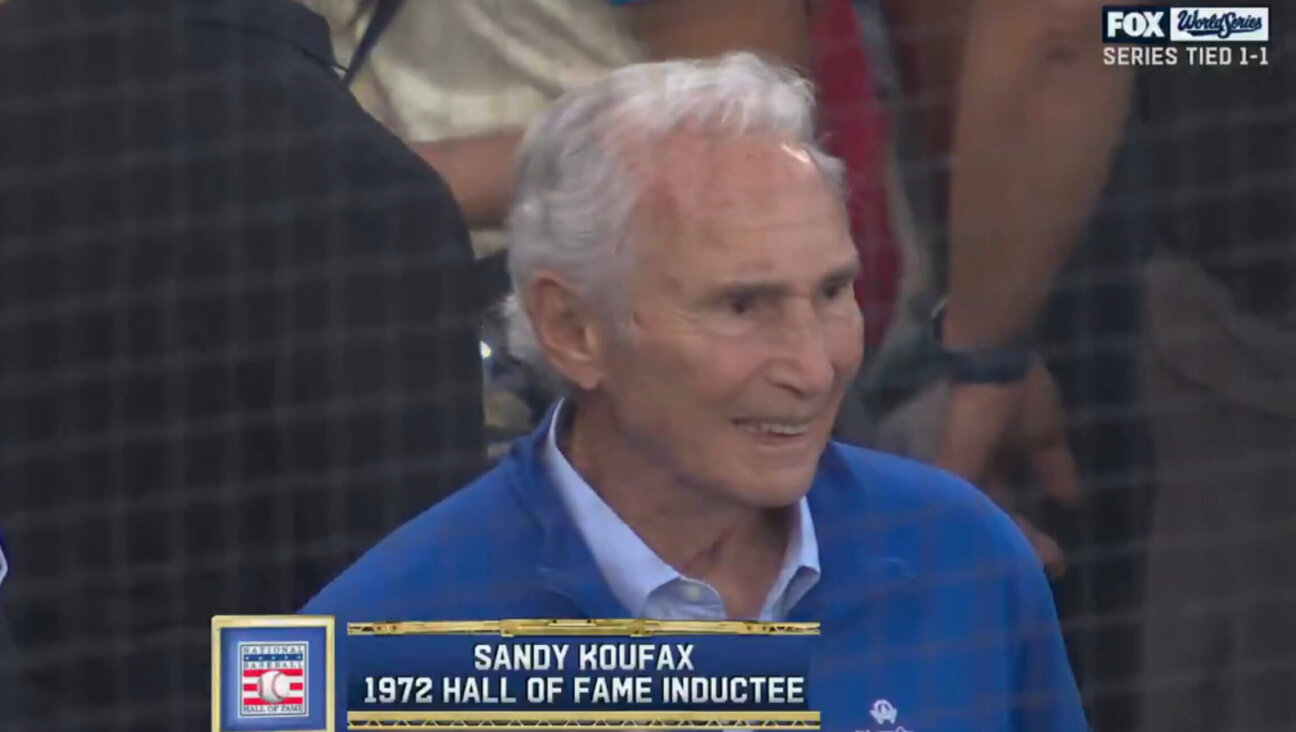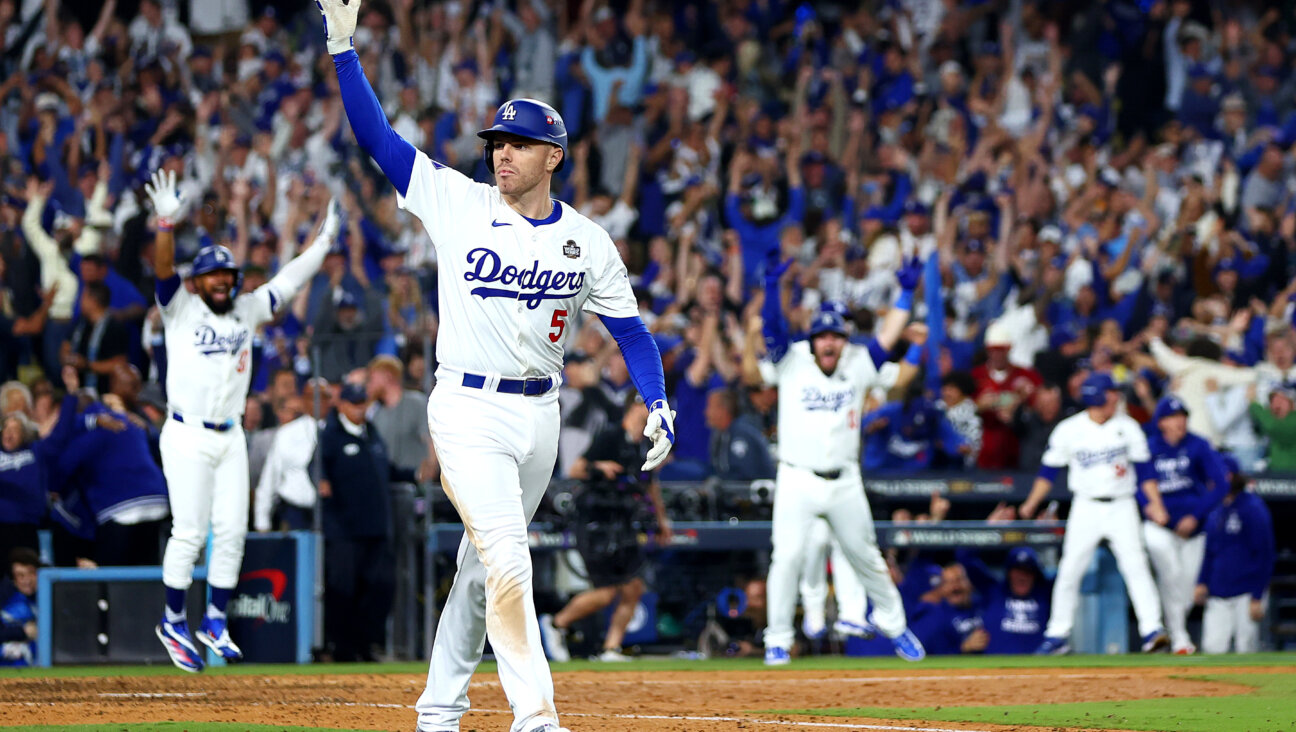As MLB veteran Kevin Pillar enjoys a late-career resurgence in LA, he’s come to appreciate his place as a Jewish baseball star
In a wide-ranging interview with JTA, Pillar reflected on his upbringing, his relationship with Israel and his legacy as one of the game’s most accomplished Jewish players

Kevin Pillar celebrating in the dugout after hitting a two-run home run against the New York Yankees, May 28, 2024, in Anaheim, CA. (John Cordes/Icon Sportswire via Getty Images)
ANAHEIM, Calif. — In a home game against the Houston Astros on Friday, Kevin Pillar crushed the first pitch he saw 411 feet into the left-field stands — giving the L.A. Angels their first and only run in a 7-1 loss.
But for Jewish fans, the most memorable plays of the game may have come in the first and fifth innings, when Pillar fielded two balls in center field off the bat of Astros third baseman Alex Bregman. Both ballplayers are Jewish.
Pillar, 35, says moments like that have begun meaning more to him, too. Now in his 12th season in a journeyman career that has seen him play for nine teams, Pillar has gradually realized, in his words, that he has “become a little bit more of an idol, a folk hero for the Jewish community” eager to see Jews on the field.
“Being a Jewish baseball player, I never really thought anything about it,” Pillar told the Jewish Telegraphic Agency. But now, he said, “You just understand there hasn’t really been a lot of Jewish baseball players to play in the major leagues, and it’s just been a cool thing to be able to tap into a different part of me that I didn’t really understand the importance and the value of.”
He said he appreciates “being able to give a Jewish kid that’s either from Southern California, Israel or another country, Canada, wherever, someone to look up to.”
Since he arrived at Angel Stadium at the beginning of May, he’s been setting quite an example. Pillar, who grew up in Los Angeles and played college baseball at nearby California State University, Dominguez Hills, was brought on to replace superstar Mike Trout, who is injured. In 25 games with the Angels, he’s sported a .381 batting average with six home runs and 22 RBI.
For Angels fans, Pillar’s offensive outburst has been a bright spot in a so-far losing season. Phil Cooper, a longtime fan, said he was at an Angels game against the San Diego Padres last week when he pointed Pillar out to his mother and bragged that the outfielder was Jewish.
“It’s pretty cool to have a Jewish player on the Angels right now, especially with everything going on in the world,” said Cooper, a 31-year-old L.A. native who works in advertising. “He’s one of the only Jewish players in the league, and it’s nice to be able to say he’s on my favorite team.”

Kevin Pillar hits a home run against the Houston Astros at Angel Stadium, June 7, 2024, in Anaheim, Calif. (Brian Rothmuller/Icon Sportswire via Getty Images)
Growing up, Pillar said, religion was not a focus for his family. His mother, Wendy, is Jewish, and his father, Mike, is Catholic. The Pillars celebrated both Hanukkah and Christmas, he said, and he had a bar mitzvah largely out of respect for his grandparents, who were observant.
“As a 13-year-old, you think it’s kind of cool that you have this insane party and people are here to celebrate,” Pillar said. “You don’t really understand the meaning and purpose behind it, unless you really grew up Jewish, going to temple and all that stuff. But for me, it was just another thing I did.”
One Jewish connection from his childhood has endured: Pillar played in the same Little League as retired Jewish MLB catcher Ryan Lavarnway, and though the two never played together professionally, they’ve stayed in touch. Lavarnway said Pillar’s dedication speaks to his strength of character.
“For him to be so loud and proud about it now, it just speaks volumes,” Lavarnway told JTA about Pillar’s Jewish identity. “The way that he’s done it has been exactly how you would want it. If you are a parent, and you want your kid to have a role model, Kevin Pillar is exactly who you would want it be.”
Lavarnway added, “He’s someone that I have been proud to know, someone I’m proud to have come from the same area, and someone that I’m proud is another Jewish player in the league.”
As a student at a Catholic high school with required religion courses, Pillar said he latched onto the ways in which religions are alike.
“I started to gain an appreciation for what other religions think and how they believe, and understanding that a lot of them aren’t too far off from each other,” Pillar said. “Even to this day, people ask me, what’s my religion? I say I’m half Jewish, I’m half Catholic. But at the end of the day, religion is a choice, and I just choose to believe in what I believe in.”
In practice that means Pillar has maintained the tradition he grew up with — celebrating both Christmas and Hanukkah. He also said he believes “in a lot of the core beliefs that all religions believe in — treating people how you want to be treated. Don’t lie. Marriage is a sacred thing.”
With two children of his own — a 6-year-old daughter and 4-year-old son — Pillar said he and his wife Amanda stay up at night talking about how to approach religion in their home. His daughter has started to ask questions, he said.
“She wants to know about God and what that means,” Pillar said. “It challenges me to take a little bit more time for myself to understand both sides and understand how to best explain that to a child, and how to get them to believe there’s something bigger than us in this world, the reason that we’re all here. I look forward to those difficult conversations as she grows up.”
Pillar said religion is not a common topic of conversation in the MLB clubhouses he’s been in, but that he never shies away from his Jewish identity. In Toronto, where he played his first several seasons, Pillar said he was involved in the local Jewish community.
Toronto is the only team Pillar stayed on for more than one season, and the path his career has since taken has made local connections harder. “It’s been more of a challenge, going from city to city, it’s hard to fully invest in that stuff,” he said.
Pillar said he wasn’t able to go on a Birthright trip to Israel because of the demanding schedule that came with pursuing a career in professional baseball in his youth. He hopes to visit one day soon and said, amid the Israel-Hamas war, that it is in his prayers.
In the meantime, he’s donated to the country. In 2016 he established the Pillar-Lambert Scholarship in Accounting at Tel Aviv University, in honor of his late grandfather Ed Lambert.
“I’m hoping and I’m praying that sometime soon, that that part of the world, Israel especially, comes back to the safe place that it once was,” Pillar said. “I think it’s a powerful thing to be able to go there, for me, to see that plaque that was put up at Tel Aviv University, but also just going to the holiest place, and just feel that energy there.”
Another way Pillar hopes to connect with Israel is by representing it in international competition. Ballplayers who are eligible for Israeli citizenship are allowed to play for Team Israel, and he had committed to joining the team for last year’s World Baseball Classic. He ultimately bowed out so he could focus on competing for a roster spot with the Atlanta Braves.
Israel has already secured a spot in the 2026 tournament, and Pillar said whether he’s still playing in the majors or not, he plans to be a part of that team — where he would finally be part of the same organization as Lavarnway.
“I’ll be the young age of 37 years old at that point,” Pillar said. “I will find a way to stay in baseball shape and go play those qualifying games, prove that I can still play, and hopefully earn a spot on that team.”
For now, Pillar is leaning into the baseball cliche of taking things one game and one at-bat at a time. He ranks among the best Jewish hitters in a number of categories, and has surpassed notable MLB career thresholds including 1,000 hits, 100 home runs, 100 stolen bases and 500 runs scored. But Pillar said he hopes his legacy is about more than just statistics.
“No one’s going to, say, ‘Oh, that guy was part of this 1,000 hit, 100 homer’ — nobody’s going give a s— about that,” Pillar said. “People are going to talk about that I was a good dude, I was down to earth, I was a good teammate, played the game hard. That’s how I want to be remembered.”
He added, “And if part of it is being remembered as one of the greatest Jewish hitters of all time, I will gladly wear that badge of honor. I will celebrate that. I will embrace it.”
This article originally appeared on JTA.org.
















